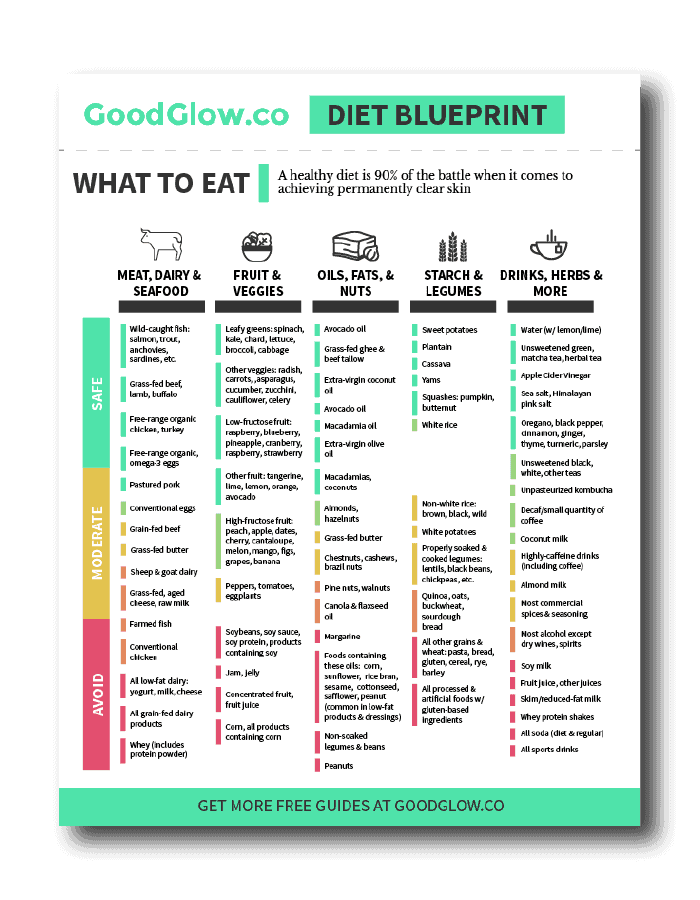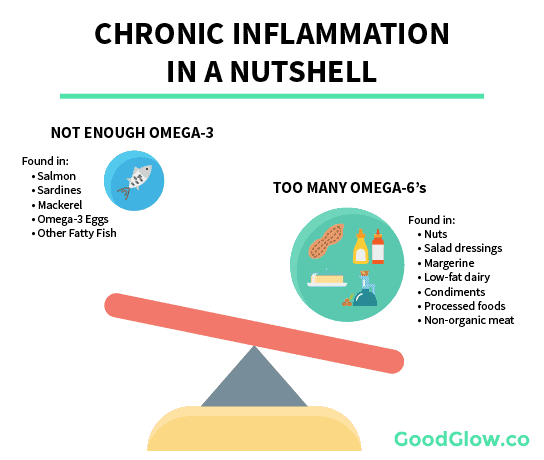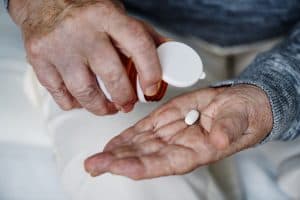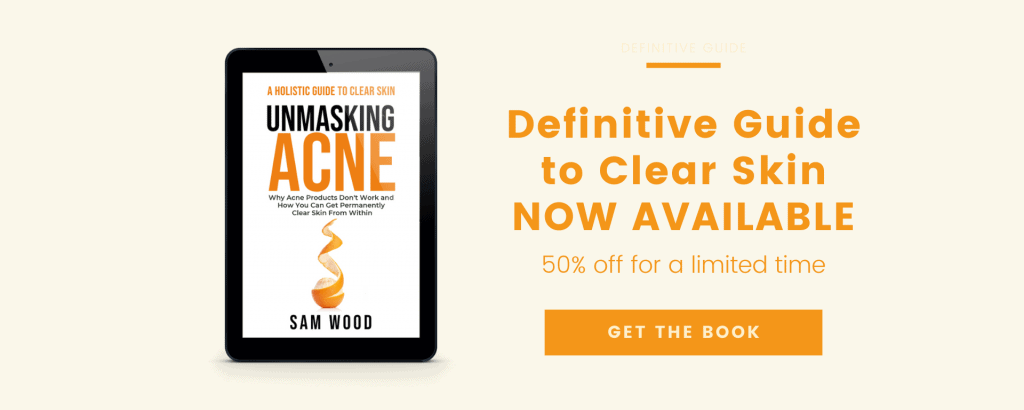Can multivitamins really make your acne worse? Believe it or not, your multivitamin might be doing more harm than good when it comes to your skin.
While the debate has been out for a while now about whether or not multivitamins actually work, it’s no secret that many of the most popular multivitamins sold today are loaded with certain vitamins and minerals that can cause acne.
On top of that, many multivitamins contain very small amounts of vitamins and minerals that fight acne.
There’s plenty of reasons your skin might clear up after cutting out your multivitamin or switching to skin-friendly supplements.
In this article we’ll cover:
- Why multivitamins can cause acne
- Should you take a multivitamin if you have acne?
- Better alternatives to taking a multivitamin
Can Multivitamins Cause Acne?
Believe it or not, you can have too much of a good thing. Multivitamins often contain high amounts of nutrients that, in excess, can cause acne. This includes vitamin B12, biotin, and calcium.
In addition to having too many acne-causing vitamins and minerals, multivitamins typically also contain synthetic/artificial forms of essential nutrients for clear skin, including vitamin A, vitamin B9, and vitamin C.
Long story short, multivitamins contain too much of the wrong stuff (nutrients that in excess cause acne) and not enough of the right stuff (nutrients that prevent acne).
Let’s take a quick look at a handful of problematic nutrients for acne that most multivitamins are extremely high in…
Vitamin B12
Vitamin B12 promotes inflammation-causing compounds found in acne, which can contribute to inflammatory acne1https://www.ncbi.nlm.nih.gov/pmc/articles/PMC6049814/. This inflammation can take a relatively harmless acne infection and turn it into a bright, red, protruding pimple.
One study found that vitamin B12 altered the gene expression of the skin, making it more prone to inflammation2https://www.ncbi.nlm.nih.gov/pmc/articles/PMC6049814/.
Nearly all men’s and women’s multivitamins (food-based and artificial) contain insane amounts of vitamin B12.
The daily recommended intake of vitamin B12 is somewhere around 2.4mcg per day. Your typical multivitamin has upwards of 5, 10, or even 20 times that amount.
This extreme intake of vitamin B12 through multivitamins could cause worsen existing acne and trigger the inflammation that makes pimples.
Biotin (Vitamin B7)
Biotin plays an important role in the health of your skin, nail, and hair. In fact, biotin deficiency can lead to hair thinning, brittle nails, and itchy skin.
Just like vitamin B12, the problem isn’t biotin, the problem is too much biotin.
Biotin, or vitamin B7, works together with vitamin B5 to protect and moisturize the skin:
- Vitamin B5 (pantothenic acid) helps protect the surface of the skin (this includes acne prevention)
- Vitamin B7 (biotin) helps protect the barrier between the skin and the outside world (also important for acne)
You need both biotin and pantothenic acid for healthy skin. Problems arise when you have too much biotin and not enough vitamin B5.
Your body absorbs pantothenic acid and biotin using the same receptors. Basically, biotin and pantothenic acid compete with each other. If you have too much biotin, it’ll be difficult for your body to absorb any pantothenic acid, which can lead to dry, acne-prone skin.
Most multivitamins contain anywhere from 100-3,000% of the daily recommended intake of biotin, especially if the multivitamin is marketed towards women.
Calcium
Isn’t calcium good for you? Doesn’t it help make your bones strong? Well, not quite.
Calcium may impair the body’s ability to absorb zinc. Zinc is one of the most critical nutrients for clear skin. It helps regulate the skin-shedding process, decrease inflammatory acne, and transport vitamin A throughout the body. One study found that after 12 weeks of treatment with zinc, the mean acne score fell from 100% to 15%3https://jamanetwork.com/journals/jamadermatology/article-abstract/536705.
High calcium content is one of the primary reasons to stay away from dairy for clear skin.
Again, the problem isn’t calcium, but too much calcium.
If you’re eating a dairy-heavy or calcium-rich diet, you may want to avoid multivitamins that add even more calcium to your diet.
Multivitamins are Low In Acne-Fighting Nutrients
Not only do vitamins contain too much of the wrong stuff, but they contain very few bioavailable skin-clearing nutrients.
For instance, many vitamins contain high amounts vitamin A in the form of beta carotene, a form of vitamin A that is extremely inefficient for the body to use. Other vitamins may be high in certain B-vitamins vitamin C, or vitamin E, but not the right type. Most vitamins contain folic acid or ascorbic acid, which are forms of vitamin B and vitamin C that aren’t easily converted into usable nutrients.
Unless it’s a real, whole-food-based multivitamin (which is still usually high in vitamin B12, biotin, and calcium), odds are you’re just flushing money down the drain by buying multivitamins for your skin.
Still, there are some supplements that may be necessary for clear skin.
Better Alternatives to Multivitamins – The Best Supplements for Acne
Rather than taking a single multivitamin for healing acne, I recommend supplementing with specific, high-quality, bio-available forms of a handful of the most important acne-fighting nutrients.
But before we even get started on the topic of supplements, let me just say this:
Supplements Do Not Make Up for an Unhealthy Diet
Whenever possible, I recommend getting your nutrients through whole-food sources. As you’ll see here, most the of the supplements I recommend are derived from food. If you’re eating a diet that triggers the root causes of acne, the supplements you take aren’t going to matter much in the long-run.
If you’re looking for a good starting place when it comes to diet and acne, the GoodGlow Diet Blueprint is a great first step. It has everything you need to start eating an acne-free diet, all on one page.

For more information on supplements, see my full guide to Supplements for Clear Skin here.
Zinc
Zinc is such an important nutrient for acne that I wrote an entire Guide to Zinc for Clear Skin.
Here’s the summary:
- Zinc helps prevent dead skin cells from clogging pores
- Zinc can help prevent inflammatory acne
- Zinc assists in transporting vitamin A to the skin
- Zinc may improve sleep, which leads to lowers stress hormones and better health
- Zinc may strengthen the digestive system
We even have a handful of studies that show just how powerful zinc can be:
- One study found that the number of lesions (pimples, cysts, acne, etc.) decreased by about 33% after 6 weeks of supplementing with zinc
- Another study found that after 12 weeks of treatment with zinc, the mean acne score fell from 100% to 15%
Zinc is clearly a critical component of clear skin, but it’s extremely difficult to get through our diet. Oysters, lamb, beef, and shrimp are a few of the only reliable source of zinc.
On top of that, eating grains, legumes, or even dairy might drastically limit your body’s ability to absorb zinc4https://www.ncbi.nlm.nih.gov/pubmed/10801947.
If you don’t eat much beef, lamb, turkey, shrimp, or oysters, or you eat large amounts of foods high in phytic acid, including grains (bread, pasta, rice, etc.) legumes, beans, spinach, chard, dark and chocolate, then I’d recommend supplementing with zinc.
Zinc picolinate has been shown to be the most easily accessible form of zinc for the body. I take anywhere from 15mg to 60mg daily depending on my diet.
Omega-3 Fatty Acids/Fish Oil
Omega-3 fatty acids are one of the best tools available for combating inflammatory acne.5https://www.ncbi.nlm.nih.gov/pmc/articles/PMC3543297/
Eating too many inflammation-causing omega-6 fatty acids and not enough anti-inflammatory omega-3 fatty acids can throw off your body’s immune system. Your body ends up seeing every acne infection as a major threat and sends a typical inflammatory response – the area swells and becomes red. In other words, a pimple is formed.

Unless you’re eating wild-caught fatty fish once or twice per week, you may want to consider taking an omega-3 supplement. This is especially true if you have protruding, red, inflamed pimples, not just acne.
I recommend taking either a krill oil supplement or a high-quality, reputable, fresh fish oil supplement. Quality and freshness really matter when it comes to fish oil supplements because fish oil can easily go rancid and cause inflammation and acne. Krill oil is less likely to go rancid and more shelf-stable, but is more expensive and has less omega-3 than fish oil.
Vitamin D
Vitamin D is really a hormone, and it’s responsible for the expression of more than 1,000 genes.
Every root cause of acne, from inflammation to insulin resistance, is touched in one way or another by vitamin D. One study found that 95% of people with acne were deficient in vitamin D6https://www.ncbi.nlm.nih.gov/pubmed/26413187.
The ideal way to get enough vitamin D is through sun exposure, but for those of us who live in a colder climate or don’t have ample access to the outdoors may need to supplement with vitamin D.
Vitamin D3 is the body’s preferred form of vitamin D and the most bioavailable when it comes to supplements. Whenever you can, take vitamin D3 with a skin-safe, healthy fat, like coconut oil.
Vitamin A & Liver Supplement
Vitamin A is necessary for proper skin, eye, bone, and immune health.
It tackles most of the root causes of acne:
- Reduces the size of the sebaceous gland, which produces pore-clogging sebum oil
- Improves wound healing, which can help heal acne scars faster
- Acts as an antioxidant that protects the skin against free radicals
- Helps regulate the skin shedding process and ensures dead skin cells don’t clog pores
- Reduces inflammation
Vitamin A is extremely important for clear skin. Unfortunately, most of us aren’t getting enough usable vitamin A through our diet. Plants contain a form of vitamin A known as beta carotene and must be converted into retinol vitamin A in order to be used by the body. Only a fraction of vitamin A found in plants actually ends up being stored in the liver.
On the flip side, vitamin A found in animals can be easily used by the body. Where can you find animal-based vitamin A? Pretty much only in liver. Beef, chicken, pork, lamb, and cod liver are all great sources of vitamin A.
That’s why I recommend one of two things:
- Eat 2-4oz. of liver per week
- Take grass-fed beef liver supplements
Either will work, I personally alternate between the two, but for a lot of Americans clean, grass-fed liver isn’t readily available, so supplements are a must.
Note: Liver is one of those cuts of meat that you’ll want to get grass-fed/organic. The quality of the liver can drastically alter the composition of the food.
Magnesium
Magnesium is a lot like vitamin D. It affects a wide array of bodily functions, including several root causes of acne like insulin resistance, inflammation, sleep, and stress hormones. It’s also extremely difficult to get enough magnesium through food alone, which is why most Americans are deficient in it7https://www.ncbi.nlm.nih.gov/pubmed/12949381?dopt=AbstractPlus.
Foods that used to be extremely rich in magnesium are much lower in modern times due to our farming practices. Even if you’re eating lots of magnesium-rich foods, like sunflower seeds, spearmint, and dark leafy greens, you may be deficient in magnesium.
I use magnesium chloride, which comes in a spray and is easily absorbed by the body.
Iron
Iron is a vital mineral that helps regulate the immune system. It also aids in collagen production and circulation. Iron is found in animal meats, as well as vegetables like lentils, spinach, and peas.
Iron deficiency is most common in women who are menstruating because iron levels are depleted more quickly during their periods. When iron levels decrease the reduced collagen production and blood flow can trigger acne breakouts. This is why many men and women who suffer from anemia can supplement with iron to reduce acne breakout.
Putting It All Together
We went over why multivitamins cause acne: they contain extremely high quantities of acne-causing nutrients like vitamin b12, biotin, and calcium. They’re also very low in bioavailable nutrients that can help fight acne.
Next, we talked about a better strategy for getting the nutrients you need to achieve clear skin through specific supplements, including vitamin A, zinc, omega-3 fatty acids, vitamin D, and magnesium.
Finally, I’d like to remind you that no supplement is going to be able to make up for an acne-causing diet.
Getting your diet under control is the first and most important step towards clear skin.
If you’re looking for a good starting place, check out our new book, Unmasking Acne – we go over the root causes of acne, along with dietary and supplement strategies that you can use to get permanently clear skin from within.
What supplements have you tried for clear skin? Have you seen any results? Let me know in the comments below!
Frequently Asked Questions
Some types of acne can be triggered or exacerbated by taking supplements. Vitamins B6, B12, & whey protein have been known to exaggerate acne breakouts in teenagers and young adults.
Over supplementing with iron can cause oxidation with Polysaturated Fatty Acids (PUFA). The can cause blemishes and inflammation on the skin as well as other organs. If you are considering supplementing your diet with iron make sure to discuss it with your doctor.
Yes! Vitamin C supplements contain anti-inflammatory properties that reduce the swelling and severity of acne. Vitamin C supplements are most effective on acne when they are applied with a topical agent rather than ingesting a pill or tablet.



The grass fed beef liver supplement link provided says that it contains 230% daily value (13.6 mcg) for vitamin B12. Wouldn’t this make the acne worse still? I ask because I’m now 100% sure that the B Vitamin complex I’m taking is causing an extreme flare up of acne for me-worse than I’ve ever seen as an adult, and my sckin is already super prone to inflammation as it is.